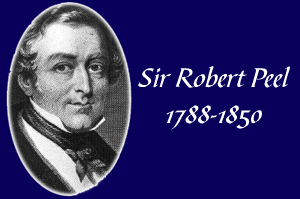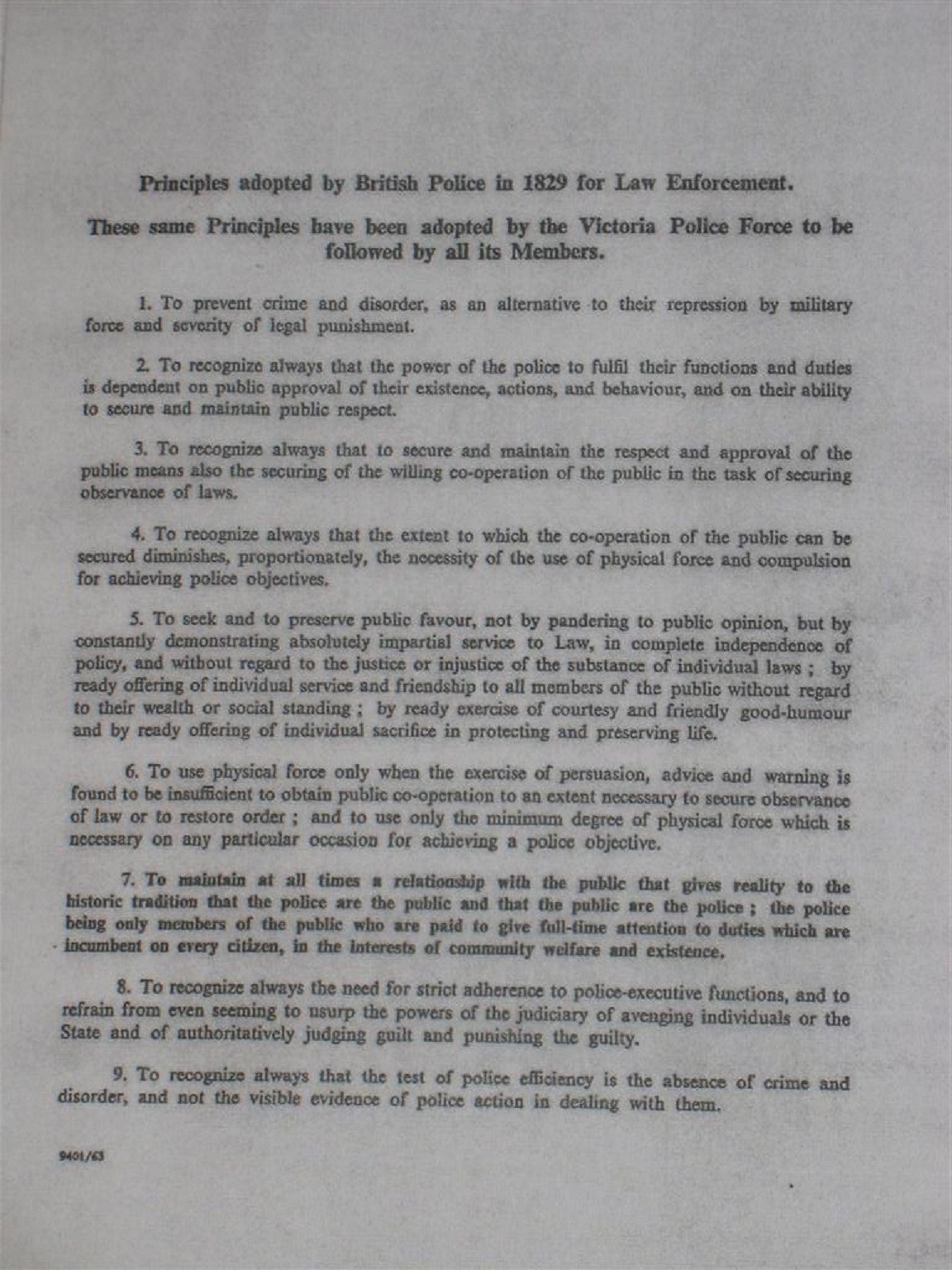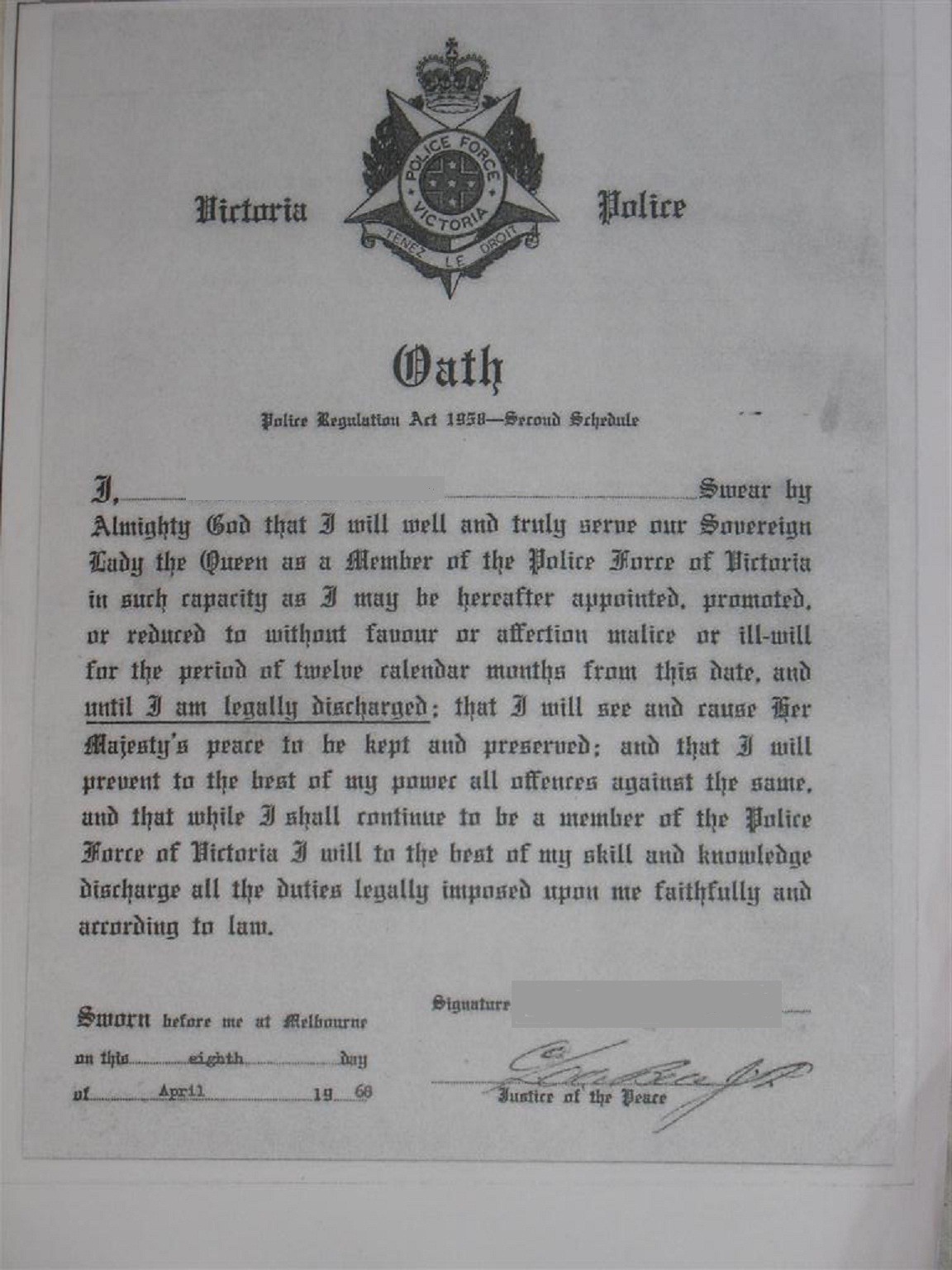
Principle 7 :
“To maintain at all times a relationship which gives reality to the historic tradition that the police are the public and that the public are the police; the police being only members of the public who are paid to give full time attention to duties which are incumbent on every citizen, in the interests of community welfare and existence.”
The following document comes via Australia and is found on the back of the Victoria Police Service’s oath for the office of Constable. This is the format on which all protocols for the British Constabularies and those throughout the Commonwealth operated from 1829 until the Thatcher Cabinet sold our infrastructure to the Bank for International Settlements under the agenda of privatisation.
The Constabularies today act under corporate guideline control, hence the reason the following codes are nowhere to be found in British policing today, and worse, the entire system has deliberately removed this information from public view in order we are disadvantaged when we try to position the police back on their Constitutional Oath as they act contrary to it by enforcing statutes against the rights afforded to us through the Constitutional Realm of Great Britain.
The reason for this dereliction of duty comes in the fact, they are no longer Constabularies, they are private corporations operating under charitable status which means they are unaccountable to the public. By claiming to be the Constabulary they are impersonating the Constabulary. They’re only authority is Fear.[1]
When did we the people consent to corporate rights over constitutional rights?
Principle 5 – gives the paradigm in which both a Police Constable and Citizen of the realm can operate, it has strict boundaries in order it can be ascertained the moment there is a breach of the principles :
“to seek and to preserve public favour, not by pandering to public opinion, but by constantly demonstrating absolutely impartial service to law, in complete independence of policy.”
Policy is the legislation dished out by government, it is the rules for those employed by the government, it is not an authority over the public at large, only those taking a direct salary. Under the Sole Corporate model we have today, all benefits and pensions are seen as a salary, even though it is your money.
The original principles are sound and make clear it is the duty of all citizens to ensure the law (not statutes) are being upheld, by the population itself and by the police, judiciary and the entire constitutional realm.
The principles also contain the direction which cancels out policing by statistics and through high visibility methods, stating the absence of crime and disorder are the measure of their competence.
The Australian Document :
The Australian police oath is very different from the British oath which suggests the systems set up in the early days in the colonies were formed to support statutes. This of course translates to show the new worlds were deliberately constructed to synchronise with commercial rules of serfdom, while mimicking the Constitutional Realm of Great Britain.
The corporate realm has of course issued some fantasy guidelines completely outside the rules of the Constabulary, and thus do not carry in law. The new principles which must have gained royal approval, are a treasonous set of guidelines indeed :
The new statement of Mission and Values for the Police Service
The mission of the police is to make communities safer by upholding the law fairly and firmly; preventing crime and antisocial behaviour; keeping the peace; protecting and reassuring communities; investigating crime and bringing offenders to justice.
We will act with integrity , compassion , courtesy and patience , showing neither fear nor favour in what we do. We will be sensitive to the needs and dignity of victims and demonstrate respect for the human rights of all.
We will use discretion , professional judgement and common sense to guide us and will be accountable for our decisions and actions. We will respond to well-founded criticism with a willingness to learn and change.
We will work with communities and partners , listening to their views , building their trust and confidence , making every effort to understand and meet their needs.
We will not be distracted from our mission through fear of being criticised. In identifying and managing risk , we will seek to achieve successful outcomes and to reduce the risk of harm to individuals and communities.
In the face of violence we will be professional , calm and restrained and will apply only that force which is necessary to accomplish our lawful duty.
Our commitment is to deliver a service that we and those we serve can be proud of and which keeps our communities safe.
Source
They are of course speaking of the corporate Stakeholder Communities run from outside the Realm and controlled by : Who Chose the Sheriff
Note
[1] Fear Authority
Further Study
Right to the Highways : Molmutine Laws
Magna Carta
Provisions of Oxford and Westminster
English Bill of Rights
British Law
British Police Oath
PCC Oath

